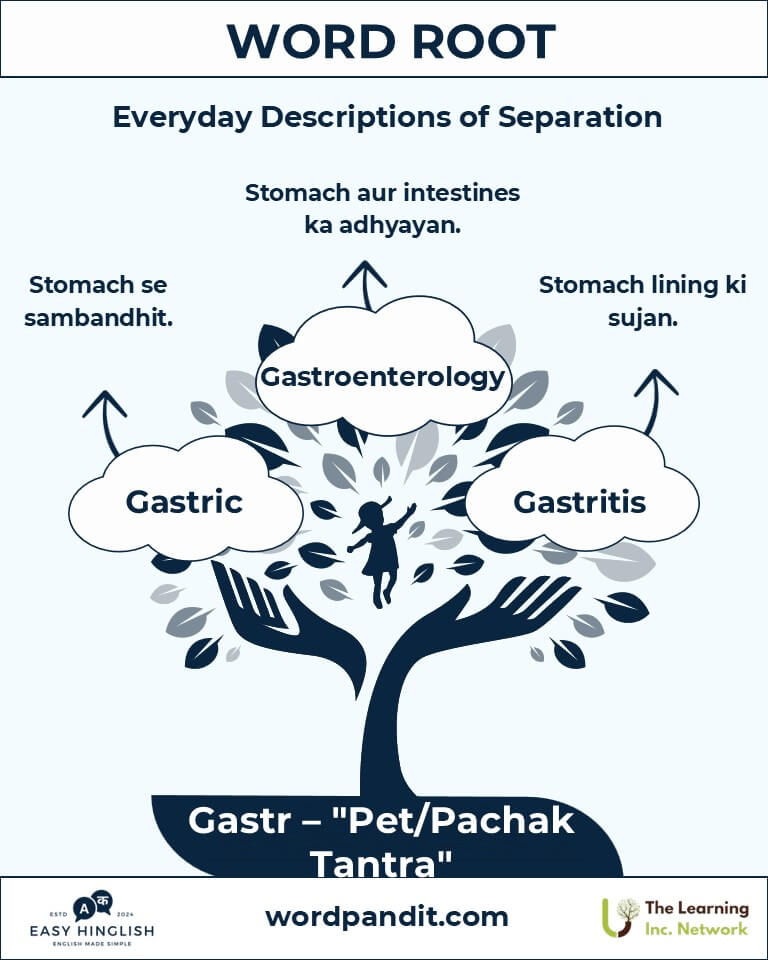Gastr: Exploring the Language of the Stomach
(Gastr: पेट की भाषा को समझना)
Discover the dynamic word root "gastr," derived from the Greek word for "stomach." From the science of digestion to the art of gastronomy, this root nourishes our understanding of language and life.

Table of Contents
- Introduction: The Heart of Gastr
- Etymology and Historical Journey
- Mnemonic: Unlocking the Power of Gastr
- Common Gastr-Related Terms
- Gastr Through Time
- Gastr in Specialized Fields
- Illustrative Story: Gastr in Action
- Cultural Significance of Gastr
- The Gastr Family Tree
- FAQs About the Gastr Word Root
- Test Your Knowledge: Gastr Mastery Quiz
- Conclusion: The Living Legacy of Gastr
Introduction: The Heart of Gastr
(Gastr का मूल अर्थ)
The word root "gastr" refers to the stomach and digestion. It appears in medical, culinary, and biological terminology, showing how essential the stomach is in various aspects of life.

Etymology and Historical Journey
(Gastr की उत्पत्ति और इतिहास)
The word "gastr" comes from the Greek word "gastēr," meaning "stomach." It evolved into various medical and culinary terms in Latin and later in English.
("gastr" शब्द ग्रीक शब्द "gastēr" से आया है, जिसका अर्थ "पेट" है। यह लैटिन में विकसित होकर विभिन्न चिकित्सा और पाक-कला शब्दों में बदल गया।)
Mnemonic: Unlocking the Power of Gastr
(Mnemonic के ज़रिए Gastr को याद रखें)
Imagine a gourmet chef holding a large stomach-shaped pot, preparing a delicious dish. This visual connects "gastr" with food, digestion, and the stomach.
Mnemonic Device
"Gastr is all about the gut – from gourmet to gastric issues!"
Common Gastr-Related Terms
(Gastr से जुड़े आम शब्द और उनके अर्थ)
- Gastric: Related to the stomach.
Example: "Gastric ulcers can cause discomfort." - Gastronomy: The art and science of good eating.
Example: "French gastronomy is famous worldwide." - Gastroenterology: The branch of medicine dealing with the stomach and intestines.
Example: "A gastroenterologist treats digestive disorders." - Gastroesophageal: Related to the stomach and esophagus.
Example: "Gastroesophageal reflux causes heartburn."
Gastr Through Time
(समय के साथ Gastr का सफर)
- Ancient Greece: The term "gastēr" was used to describe the stomach’s role in digestion.
- Middle Ages: The study of gastric ailments expanded, leading to early medical texts.
- Modern Science: Gastroenterology became a specialized medical field.
Gastr in Specialized Fields
(विशिष्ट क्षेत्रों में Gastr का उपयोग)
- Medicine: "Gastroenterology" is a major medical field.
- Culinary Arts: "Gastronomy" is the study of food and culture.
- Biology: "Gastric juices" play a key role in digestion.
Illustrative Story: Gastr in Action
(एक कहानी जो Gastr का महत्व दिखाती है)
Arjun, a passionate chef, wanted to revolutionize the food industry. He studied gastronomy and discovered the science behind flavors and digestion. By blending traditional spices with modern techniques, he created dishes that not only delighted the taste buds but also aided digestion. His journey highlighted how "gastr" connects food, health, and culture.
Cultural Significance of Gastr
(Gastr का सांस्कृतिक महत्व)
From Greek feasts to modern gourmet cuisine, the study of "gastr" has played a central role in how societies prepare and enjoy food. It symbolizes nourishment, culture, and scientific advancements in digestion.

The Gastr Family Tree
(Gastr परिवार के संबंधित शब्द)
- Gastro- (Greek: "stomach")
- Gastric: Related to the stomach.
- Gastroesophageal: Connecting the stomach and esophagus.
- Gastron- (Greek: "food and eating")
- Gastronomy: The study of food culture.
- Gastronomic: Related to gourmet food.

FAQs About the Gastr Word Root
Q: What does "Gastr" mean, and where does it come from?
A: "Gastr" means "stomach" and comes from the Greek word "gaster." It is commonly found in medical terms (like gastritis) and culinary arts (like gastronomy).
Q: What is the difference between Gastritis and Gastroenterology?
• Gastritis: A medical condition where the stomach lining becomes inflamed, often due to stress, infections, or alcohol overuse.
• Gastroenterology: A specialized medical field focusing on the digestive system, including the stomach, intestines, and pancreas.
Q: What role does gastric juice play in digestion?
A: Gastric juice, produced by the stomach lining, is essential for digestion. It contains hydrochloric acid, which kills bacteria and activates digestive enzymes like pepsin to break down proteins.
Q: What is molecular gastronomy, and how is it different from traditional cooking?
• Traditional cooking: Based on established recipes and methods.
• Molecular gastronomy: A modern culinary branch that applies scientific principles to cooking, using techniques like spherification and liquid nitrogen to create innovative dishes.
Q: What does gastrulation signify in embryology?
A: Gastrulation is a crucial stage in embryonic development where three germ layers (ectoderm, mesoderm, and endoderm) form, laying the foundation for organs and tissues, including the digestive system.
Q: When and why is a gastrectomy needed?
A: A gastrectomy is a surgical procedure where part or all of the stomach is removed due to conditions like stomach cancer, ulcers, or tumors. Patients may require dietary adjustments after surgery but can live a healthy life with proper medical care.
Q: What is the cultural significance of gastronomy?
A: Gastronomy treats food as a cultural and artistic expression. Studying regional cuisines and food science celebrates traditions, creativity, and history.
Test Your Knowledge: Gastr Mastery Quiz
1. What does "Gastr" mean, and in which fields is it commonly used?
2. What is the inflammation of the stomach lining called?
3. What does gastroenterology focus on?
4. What is molecular gastronomy, and why is it unique?
5. What does gastrulation involve, and why is it essential?
Conclusion: The Living Legacy of Gastr
(Gastr की जीवंत विरासत)
The "Gastr" root connects language, food, and medicine, showing how vital digestion is to human life. Whether in fine dining, medical research, or everyday nutrition, "gastr" continues to impact our understanding of health and culture.








